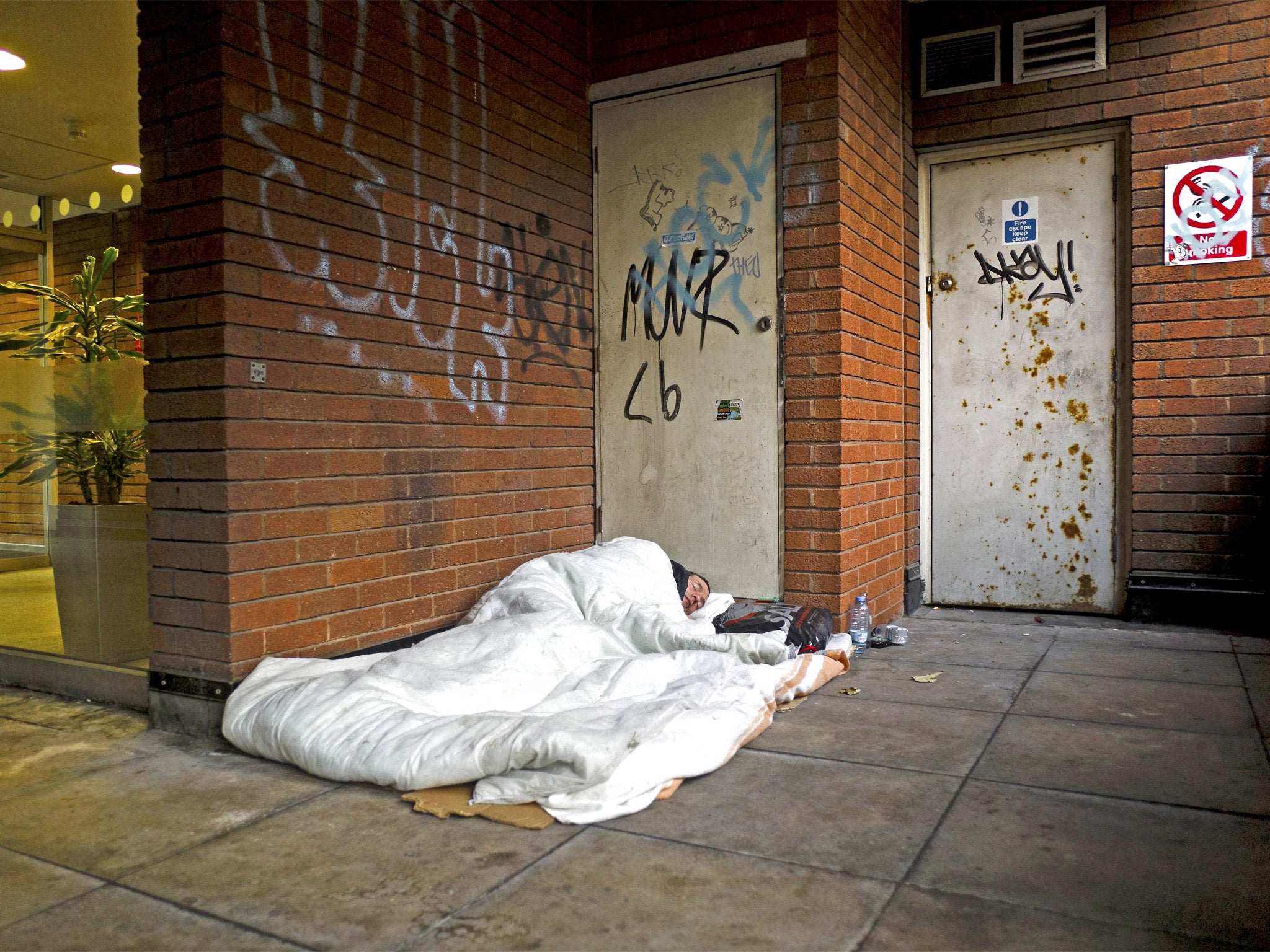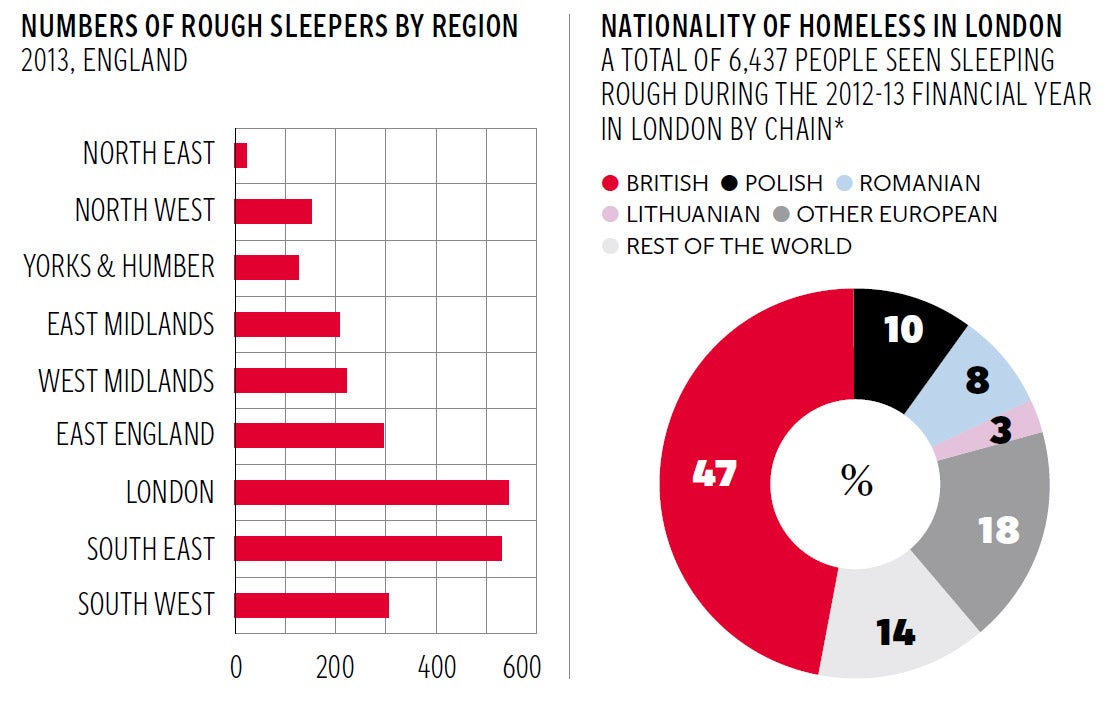Down and out in austerity Britain: Number of rough sleepers soars by 37 per cent
Local authority budget cuts blamed for forcing thousands out of shelters and on to streets

Your support helps us to tell the story
From reproductive rights to climate change to Big Tech, The Independent is on the ground when the story is developing. Whether it's investigating the financials of Elon Musk's pro-Trump PAC or producing our latest documentary, 'The A Word', which shines a light on the American women fighting for reproductive rights, we know how important it is to parse out the facts from the messaging.
At such a critical moment in US history, we need reporters on the ground. Your donation allows us to keep sending journalists to speak to both sides of the story.
The Independent is trusted by Americans across the entire political spectrum. And unlike many other quality news outlets, we choose not to lock Americans out of our reporting and analysis with paywalls. We believe quality journalism should be available to everyone, paid for by those who can afford it.
Your support makes all the difference.Rough sleeping has soared since the Coalition came into power as cuts to local housing and homeless services take effect, Government figures show.
An estimated 2,414 people were sleeping rough in England on any one night in 2013, an increase of 37 per cent on 2010. Local authority budgets have been squeezed under the Coalition, making shelters and schemes aimed at preventing homelessness increasingly vulnerable.
Snapshot surveys and estimates were conducted by local authorities over a single night in autumn 2013. These found that while rough sleeping declined in London by three per cent between 2012 and 2013, it increased elsewhere in England by seven per cent.
In 2009 the Labour Government removed the ring fence from housing support services to the vulnerable, known as Supporting People. Unprecedented cuts to local authority budgets imposed by the coalition mean many councils have been forced to strip back services aimed at preventing homelessness even further.
In Derby the number of rough sleepers has almost doubled, to 47, in the wake of dramatic council cuts. Last year Derby City Council began a two-year programme of 82 per cent cuts to its budget for supported housing. The first tranche of these cuts went through between April and October last year.
The number of rough sleepers found in Nottinghamshire increased by 78 per cent between 2011 and 2012, to 48 people. Two years ago, Nottinghamshire Council Council, then Tory-controlled, cut its Supporting People budget by 65 per cent. Now under Labour rule, the council is proposing a further cut of £3.2m for housing related services including homeless services. A budget that was £27m in 2004, could amount to just £9m by 2017.
Councillor Muriel Weisz, chair of Nottinghamshire County Council’s adult social care and health committee, said: “Unfortunately, the impact of the Government cuts on our budget means we must prioritise our statutory services – those we must do – over discretionary services such as the homeless support services.”

Shadow Housing Minister, Emma Reynolds MP, said: “It is appalling that on David Cameron’s watch the number of people sleeping rough has soared by more than a third.
“The Prime Minister once said homelessness and rough sleeping were a disgrace. But warm words are cold comfort to those sleeping rough if you fail to act.
“The Government was warned its policies risked increasing homelessness and rough sleeping but these warnings fell on deaf ears. What we are seeing now are the direct consequences of David Cameron's failure.”
In Scotland, where homeless prevention has been prioritised by the devolved government, the rate of rough sleeping has been decreasing, according to the latest figures. In 2007-08, 10 per cent of applicants for local authority homelessness assistance had slept rough the night before, by 2012-13, this dropped to four per cent.
No data has been collected on rough sleeping in Wales since 2007, though some charities estimate that there could be more than 1,000 people either sleeping rough or in an emergency shelter every night.
Mark McPherson, director of practice and regions for Homeless Link, said: “Any increase in rough sleeping is bad news, but without charities working hard to get people off the streets, the situation could have been far worse. In areas where funding has been cut to the bone, we have seen significant rises in rough sleeping.
“Councils have to make tough decisions, but removing funding will leave already vulnerable people at even greater risk. Furthermore, this will not have the desired effect of saving money as people become more damaged and require ever more complex services.”
London had 543 rough sleepers when the Government head count was conducted, accounting for 22 per cent of the national figure. However, data collected by the Combined Homelessness and Information Network (CHAIN) suggests that overall in 2012-13, there were 6,437 people in London contacted by outreach teams or who accessed accommodation for rough sleepers.
Housing Minister Kris Hopkins said: “For years, the national figure on the numbers of rough sleepers failed to reflect the true situation on our streets – we’ve changed that so every council now has to report the scale of the problem in their area.
“We’ve also introduced the No Second Night Out initiative, which actively seeks to find and help hidden rough sleepers and means that 70 per cent of rough sleepers spend no more than one night on the streets.
“And with the majority of rough sleepers in London being foreign nationals, we’ve ensured European nationals sleeping on our streets are removed, and we’ve toughened the immigration rules.”
Join our commenting forum
Join thought-provoking conversations, follow other Independent readers and see their replies
Comments